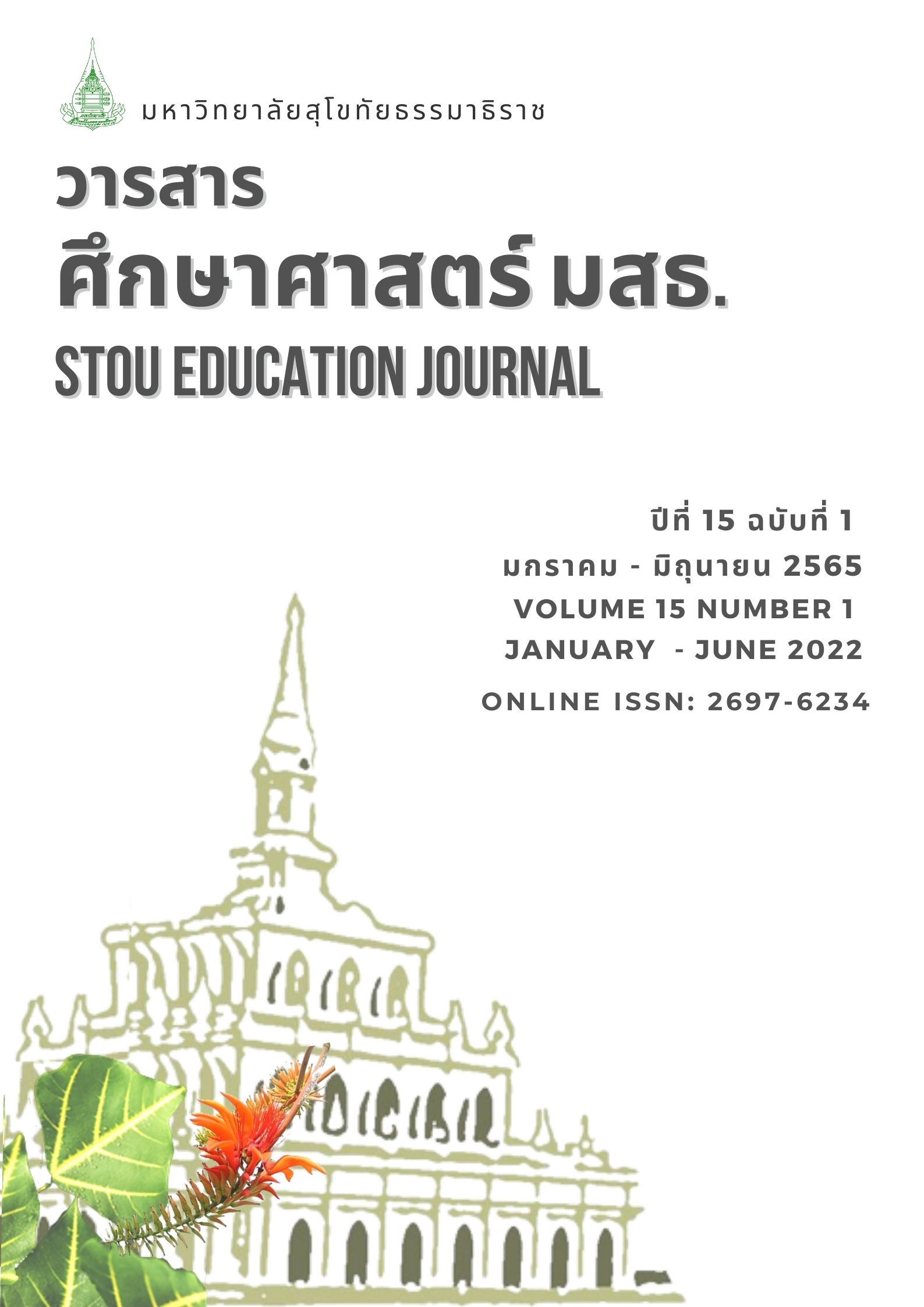การออกแบบและพัฒนาโปรแกรมส่งเสริมความพร้อมทางการเรียน ของนักเรียนประถมศึกษาปีที่ 1 โดยใช้การวิจัยอิงการออกแบบ
Main Article Content
บทคัดย่อ
งานวิจัยนี้มีวัตถุประสงค์เพื่อออกแบบ พัฒนา และศึกษาผลการใช้โปรแกรมส่งเสริมความพร้อมทางการเรียนของนักเรียนประถมศึกษาปีที่ 1 โดยใช้การวิจัยอิงการออกแบบ กลุ่มตัวอย่าง ได้แก่ นักเรียนชั้นประถมศึกษาปีที่ 1 และผู้ปกครอง 29 ครอบครัว รวมทั้งครูประจำชั้นประถมศึกษาปีที่ 1 จำนวน 2 คน การดำเนินการวิจัยแบ่งเป็น 3 ระยะ รวม 38 สัปดาห์ ได้แก่ ระยะที่ 1 การศึกษาประสบการณ์ผู้ใช้ ระยะที่ 2 การออกแบบหลักการและต้นแบบโปรแกรมฯ และ ระยะที่ 3 การทดลองใช้ต้นแบบโปรแกรมฯ เก็บข้อมูลโดยใช้แบบประเมินความพร้อมทางการเรียน แบบประเมินบทบาทครูและผู้ปกครองในการส่งเสริมความพร้อมทางการเรียน วิเคราะห์ข้อมูลโดยใช้สถิติพื้นฐาน การทดสอบค่าที และการวิเคราะห์เนื้อหา ผลการวิจัยปรากฏว่า 1) การศึกษาประสบการณ์ผู้ใช้พบว่า ครูและผู้ปกครองขาดแนวทางในการส่งเสริมความพร้อมทางการเรียนให้กับนักเรียนประถมศึกษาปีที่ 1 ซึ่งนำไปสู่กระบวนการของโปรแกรมฯ ประกอบด้วย (1.1) กระบวนการส่งเสริมความพร้อมที่โรงเรียน (1.2) กระบวนการส่งเสริมความพร้อมที่บ้าน และ (1.3) กระบวนการประสานความร่วมมือกับผู้ปกครอง โดยในแต่ละกระบวนการมีการดำเนินการคู่ขนาน ใช้ระยะเวลา 95 ชั่วโมง และ 2) ผลการใช้โปรแกรมฯ พบว่า (2.1) นักเรียนมีความพร้อมทางการเรียนทุกด้านสูงกว่าก่อนการใช้โปรแกรมฯ อย่างมีนัยสำคัญทางสถิติที่ระดับ .05 (2.2) ครูมีบทบาทในการส่งเสริมความพร้อมทางการเรียนทุกด้านสูงกว่าก่อนการใช้โปรแกรมฯ และ (2.3) ผู้ปกครองมีบทบาทในการส่งเสริมความพร้อมทางการเรียนทุกด้านสูงกว่าก่อนการใช้โปรแกรมฯ อย่างมีนัยสำคัญทางสถิติที่ระดับ .05
Article Details
เอกสารอ้างอิง
กมลทิพย์ นิ้มคธาวุฒ. (2560). บทบาทครูในการสร้างรอยเชื่อมต่อทางการศึกษาของเด็กเพื่อเข้าสู่ชั้น ประถมศึกษาปีที่ 1. [วิทยานิพนธ์ปริญญามหาบัณฑิต ไม่ได้ตีพิมพ์].จุฬาลงกรณ์มหาวิทยาลัย.
กุณฑลี บริรักษ์สันติกุล. (2558). การพัฒนาความสามารถของครูในการออกแบบการเรียนการสอนสำหรับเด็กในระยะเชื่อมต่อ จากระดับอนุบาลสู่ระดับประถมศึกษาตามแนวคิดกลุ่มศึกษาทั้ง คณะและแนวคิดการชี้แนะทางปัญญา. [วิทยานิพนธ์ปริญญามหาบัณฑิต ไม่ได้ตีพิมพ์].จุฬาลงกรณ์มหาวิทยาลัย.
กุลชา ลี้ไพโรจน์กุล. (2555). สภาพและปัญหาการดำเนินงานของโรงเรียนในการเชื่อมต่อการศึกษา ระดับอนุบาลกับระดับประถมศึกษาปีที่ 1 ในกรุงเทพมหานคร [วิทยานิพนธ์ปริญญามหาบัณฑิต ไม่ได้ตีพิมพ์]. จุฬาลงกรณ์มหาวิทยาลัย.
จิตโสภิณ โสหา. (2560). สภาพและปัญหาของครูในการสร้างรอยเชื่อมต่อทางการศึกษาของเด็กอนุบาลเพื่อเข้าสู่ชั้นประถมศึกษา. [วิทยานิพนธ์ปริญญามหาบัณฑิต ไม่ได้ตีพิมพ์].จุฬาลงกรณ์มหาวิทยาลัย.
พัชรัตน์ ลออปักษา. (2560). บทบาทของผู้ปกครองในการสร้างรอยเชื่อมต่อทางการศึกษาจากโรงเรียนอนุบาลสู่โรงเรียนประถมศึกษา. [วิทยานิพนธ์ปริญญามหาบัณฑิต ไม่ได้ตีพิมพ์. จุฬาลงกรณ์มหาวิทยาลัย.
สถาบันแห่งชาติเพื่อการพัฒนาเด็กและครอบครัว. (2562, กรกฏาคม 15). แผนงานวิจัยการปฏิรูปสุขภาวะและการพัฒนาเด็กไทยในศตวรรษที่ 21. https://www.hsri.or.th/media/news/detail/12472
สำนักงานส่งเสริมสังคมแห่งการเรียนรู้และคุณภาพเยาวชน. (2558, มีนาคม 9). เปิดสถานการณ์เด็กปฐมวัยพบเร่งเรียนตั้งแต่วัยอนุบาล. http://www.kidsradioclub.or.th/article/treatise/134
สุวิมล ว่องวาณิช. (2559). วิธีวิทยาการวิจัยทางการศึกษา: จุดประกายความคิดใหม่. ไอคอนพริ้นติ้ง.
สุวิมล ว่องวาณิช. (2563). การวิจัยการออกแบบทางการศึกษา. สำนักพิมพ์จุฬาลงกรณ์มหาวิทยาลัย.
Bronfenbrenner, U. (1980). The ecology of human development: Experiments by nature and design. Harvard University Press.
Bronfenbrenner, U., & Morris, P. A. (1998). The bioecological model of human development handbook of child psychology: Theoretical models of human development. John Wiley & Sons Inc.
Chowa, G. A .N., & Masa, R. D. (2013). The effects of parental involvement on academic performance of Ghanaian youth, Children and Youth. Elsevier, 35(12), 2020-2030. https://www.researchgate.net/publication/259120246
Commonwealth Australia. (2017, June 27). Kids Matter Starting School information sheets for families. https://www.kidsmatter.edu.au/startingschool.
Department of Education and Training Australia. (2017, June 27). Department of Education and Training Annual Report 2017/18. https://www.dese.gov.au/about-us/resources/department-education-and-training-budget-statements-2017-18
Eldelson, D. C. (2002). Design research: What we learn when we engage in design. Journal of the Learning Sciences, 11(1), 105-121. https://www.jstor.org/stable/1466722
Epstien, J. (2001). School, family, and community partnerships: Preparing educators and improving schools (2 nd ed.). Routhledge.
National Education Goals Panel. (1997). Building a nation of learners. U.S. Government Printing Office. National Foundation for Educational.
Sink, C. A., Edwards, C. N., & Weir, S. J. (2007). Helping children transition from kindergarten to first grade. Professional School Counseling, 10(3), 233237. https://doi.org/10.5330/prsc.10.3.9l11g7633859n2w1
Unicef. (2012). School readiness: A conceptual framework. UNICEF.
Van Den Akker, J. (1999). Principles and methods of development research. In Van Akker, J., Nieveen, N., Branch, R. M., Gustsfson, K. L., & Plomp, T., (Eds.) Design methodology and developmental research in education and training. Kluwer Academic Publishers.
Wang, F., & Hannafin, M. J. (2005). Design-based research and technology-enhanced learning environments. Educational Technology Research and Development, 53(4), 5–23. https://www.researchgate.net/publication/225626676
Wanner, L.,& Sower, J. C. (2005). Educating young children from preschool through primary grades. Pearson.
Woodhead, M., & Moss, P. (2007). Early childhood and primary Education: Transitions in the lives of young children (early childhood in focus 2). The Open University.


